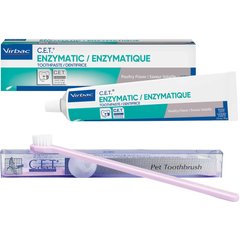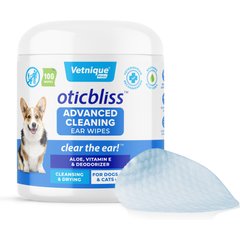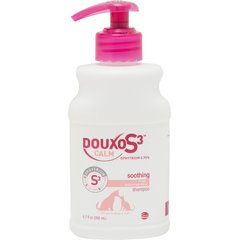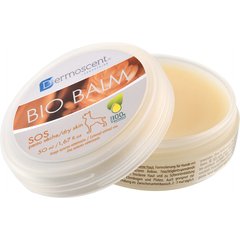10 Questions Everyone Should Ask Their Veterinarian
Bringing pets to a veterinarian for a wellness exam can be nerve-wracking and frustrating for some people. Often it isn't even the vet's fault — we just don't know the right questions to ask. Here are 10 things everyone should ask their veterinarian.
1. Is My Pet at a Healthy Weight?
More than half of the dogs and cats in the U.S. are overweight, according to a recent survey by the Association for Pet Obesity and Prevention. Even worse, many pet owners with overweight dogs or cats deny there is even a problem with their pet. Ask your veterinarian if your pet is within the appropriate weight range for her breed, size and stature. Then, if there is a problem, you can work in tandem on how to solve the issue. This also applies if you suspect your pet is underweight, though it's less typical.
Vet Recommended Health Support
- Virbac C.E.T. Enzymatic Dog & Cat Poultry Flavor Toothpaste, 70 gram & Virbac C.E.T. Pet Toothbrush, Color Varies$18.88Chewy Price
- Vetnique Labs Oticbliss Advanced Cleaning, Soothing Aloe & Odor Control, Dirt & Wax Removal Dog & Cat Ear Wipes, 100 count$14.99Chewy Price
- Douxo S3 CALM Soothing Itchy, Hydrated Skin Dog & Cat Shampoo, 6.7-fl oz bottle$22.99Chewy Price
- Dermoscent BioBalm Skin Repairing Dog Balm, 1.67-oz jar$19.95Chewy Price
2. Could I be providing a more appropriate food?
Good health begins with proper nutrition, and who best to ask what is appropriate for your pet than your veterinarian. Once they evaluate your pet they can recommend diets that are appropriate for your pet's life stage, lifestyle and any other factors or underlying health conditions that apply.
3. Is That [Insert Odd Behavior Here] Normal?
Don’t automatically assume that your pet wheezing after a bout of exercise is normal, or that it’s common for pets to itch every time they go outside. An annual pet wellness exam is a great time to ask your vet about any peculiarities you’ve noticed in your animal over the past year. Keep a running list as these things happen so you can note to your doctor exactly what the issue was, when it first occurred and how often it has occurred since.
4. Is My Pet Up to Date on Shots?
It never hurts to make sure your furry friend is totally up-to-date on all his or her vaccinations and immunizations—it’s something that can easily be overlooked.
5. Does My Pet Need a Dental Cleaning?
Dental disease is a common problem among pets. In fact, it's estimated that 80% of dogs and 70% of cats over the age of 3 years suffer from some degree of periodontal disease. If left untreated, this can lead to other more serious health complications such as issues with the kidney, liver, even the heart. Ask your veterinarian if Fido or Fluffy is due for a dental cleaning. "Rather than wait for a problem to develop," says Dr. Ashley Gallagher, a veterinarian at Friendship Hospital for Animals, "it is best to perform a teeth cleaning when only mild gingivitis and/or tartar are present. This will maintain good dental health and prevent disease before it becomes a problem … which in turn helps you save money and keep your pet healthy!"
6. Does My Pet Need a Blood Test?
Blood tests screen for a variety of issues, including kidney and liver disease, diabetes, cancer and a variety of other issues that can be treated if caught early. Regular blood tests will also give your veterinarian a baseline to compare against over time.
7. What Flea/Tick Meds Do You Recommend for My Pet?
Fleas and ticks are not only a nuisance; they can also transmit deadly diseases to you and your pet. Fortunately, there are many options when it comes to killing and preventing fleas and ticks. Ask your veterinarian about the differences between popular medications on the market (for example, topical versus oral medications) and which suits you and your pet's lifestyle the best. There are even some oral medications which protect against both fleas and ticks for up to 12 weeks with just a single dose.
8. What are these Lumps and Bumps?
It's not unusual for lumps and bumps to develop as pets age. However, unusual skin changes can also be an indication of cancer. Point out any new lumps, bumps or strange moles that have appeared since your last visit. The veterinarian can then determine if a biopsy is warranted.
9. Does My Pet Need a Rectal Exam?
Every veterinarian has a different way of doing things, but he or she may not perform a full rectal exam on your pet if you don't ask for one. Rectal exams screen for prostate and rectal cancer, which can be treatable if caught early enough.
10. Can You Please Explain my Bill?
If you ask nicely your veterinarian will be much more likely to explain why a short visit and routine procedures cost what they do. It may seem like a lot of money, but these line item expenses are probably keeping your pet healthy and happy for many years to come.
Image: XiXinXing / via Shutterstock




